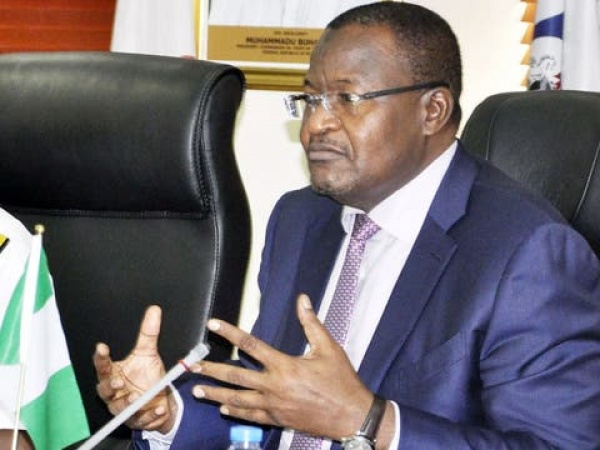Lawmakers on Monday queried the sporadic increase in the financial provision for payment of consultancy service of Nigerian Communications Commission (NCC), and N29.195 billion proposed for payment of salaries and wages in the 2021 fiscal year, against the sum of N16.850 billion approved in the 2020 fiscal year.
Members of the Joint Senate and House of Representatives’ Committee on Telecommunications, who raised the red flag during the 2020 budget performance and 2021 budget defence which was presented by the NCC Executive Vice Chairman, Umar Dambatta, also demanded an explanation over the increase in the consultancy services of N1 billion proposed for 2021 against the sum of N394.331 million approved in the 2020 Appropriation Act.
According to Dambatta, who was asked by the Director of Finance and Administration to provide details of the budget performance for the year under review, said the budget performance as at November 30, 2020, showed the total budget of N140.383 billion, but the actual came to N79.660 billion.
“For the expenditures (recurrent), a total recurrent expenditure that was budgeted was N39.297 billion and what was spent was N28.5 billion.
“Under the capital project, the total capital expenditure was budgeted at N8.129 billion and the actual as at 30th November was N1.427 billion.
“For special projects, the total budget was N20.863 billion and what has been spent so far is N13.65 billion.
“For total capital project, the budget was N28.9 billion and what was spent was N1.4 billion; Transfer to USPF, N7.5 billion was projected and N5.583 billion was spent.
“For Transfer to Federal Government of Nigeria, N64.208 billion was budgeted and N35.7 billion was remitted.”
On the revenue side, the commission realized total sum of N167 million realized out of N1.5 billion budgeted for licensing fees; realized N51.5 billion out of N68.5 billion for annual operating levy; realized N22.778 billion out N47.653 billion budgeted; realized N4.76 million out N115.196 million, respectively.
He added that the documents before the joint committees further provide insight into variances and total revenue.
Meanwhile, the documents presented to the joint Committee, proposed total revenue expected for 2021 stands at N112.810 billion and an additional sum of N49.527 billion from funds for broadband infrastructure and transfer from reserve (totalling N162.067 billion for 2021), against the sum of N123.132 billion and an additional sum of N17.252 billion from funds for broadband infrastructure (totalling N140.384 billion) for year 2020.
Similarly, the total recurrent is also expected to rise from N39.297 billion in 2020 to N61.541 billion in 2021; total capital and special expenditure are to rise from N28.993 billion in 2020 to N51.524 billion in 2021; showing an overall increase in the Commission’s total expenditure from N68.290 billion in 2020 to N113.065 billion in 2021 as proposed.
The Commission’s projected Transfer to the Federal Government for the year 2021 estimated at the sum of N42.002 billion against N64.208 for the year 2020 out of which N29.697 billion has so far been remitted in addition to N5.5 billion paid recently.
One of the aggrieved lawmakers who queried the Director of Finance and Administration’s report on the wide variance between the proposed N29.195 billion salaries and wages for 2021 and N16.850 approved for 2020 in relation to the 300 staff recruited by the Commission, alleged that: “you employed people but it was done through the backdoor.”
He, however, maintained that the nominal roll from 2019 to date will provide insight into whether or not the Commission complied with extant regulations on employment, adding that the exercise was done without the knowledge of the Nigerian public.
On his part, Hon. Siaka Adekunle Ayokunle who alleged that: “a lot of things are shredded in secrecy here”, expressed concern over the differential between the projected revenue and expenditure, inquired: “Are we really breaking even here?”
In his intervention, Senator Emmanuel Orker-Jev who expressed concern over the recruitment of the 300 staff, stressed the need for the Commission to provide the nominal roll with the view to ascertain the actual number of employees and adherence to federal character policy.
However in his response, the NCC Executive Vice Chairman, Umar Dambatta assured that the nominal roll will be made available to the Committee as requested.
Speaking earlier, Chairman, House Committee on Telecommunications, Hon. Akeem Adeyemi explained that “legislative approval to budget proposal is a cardinal ingredient of democratic practice. It provides a window of checks on the expenditure profile of the Executive, so the people, through their representatives have a say on how the Executive arm of government runs the government as part of the checks and balances of governance.
“It is pursuance to this that we are here to examine your proposal for 2021. The extent to which your Commission was able to meet its 2020 budget responsibility will also be examined to identify if they were problems and how to resolve them where they exist.
“Our commitment to the yearnings of Nigerians in meeting their expectations of service delivery is our driving force. It is also our desire to midwife an industry that can rival any, the world over,” he noted.
In his ruling, Hon. Adeyemi who directed the NCCC management team to provide the nominal roll for further legislative action, assured that the “Committee will call for interactive session sometimes next year with the view to address some of the concerns raised” by the lawmakers, as well as the entire performance of the NCC and USPF.
Nigerian Tribune














